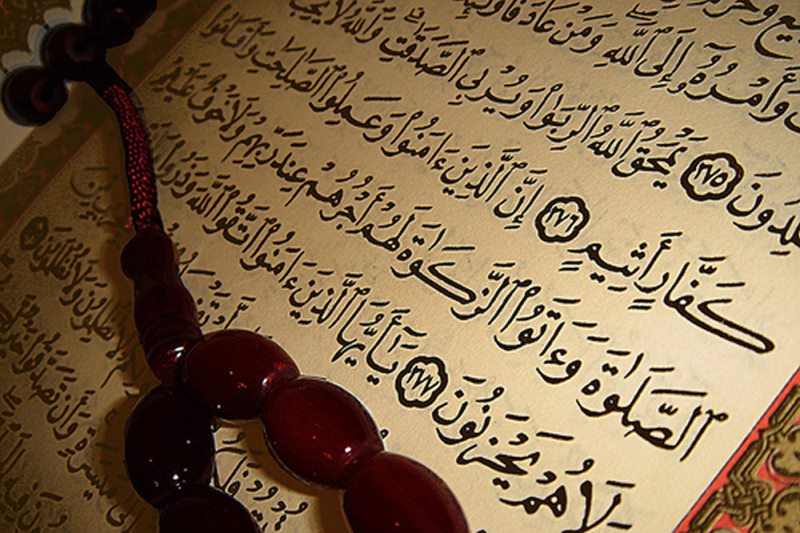يَا أَيُّهَا الَّذِينَ آمَنُوا أَطِيعُوا اللَّـهَ وَأَطِيعُوا الرَّسُولَ وَأُولِي الْأَمْرِ مِنكُمْ فَإِن تَنَازَعْتُمْ فِي شَيْءٍ فَرُدُّوهُ إِلَى اللَّـهِ وَالرَّسُولِ إِن كُنتُمْ تُؤْمِنُونَ بِاللَّـهِ وَالْيَوْمِ الْآخِرِ ذَٰلِكَ خَيْرٌ وَأَحْسَنُ تَأْوِيلًا
“O you who have believed, obey Allah and obey the Messenger and those in authority among you. And if you disagree over anything, refer it to Allah and the Messenger, if you should believe in Allah and the Last Day. That is the best [way] and best in result”
(An-Nisaa, 4:59)
1. أَطِيعُوا اللَّـهَ وَأَطِيعُوا الرَّسُولَ ‘obey Allah and obey the Messenger’: After the command ‘obey Allah’ this verse has repeated the command ‘obey’ when referring to obedience to the Messenger ﷺ. This is to signify the centrality of the Sunnah as a source of legislation in addition to the Qur’an. Therefore, Muslims are obliged absolutely to take the Qur’an and the Sunnah as the only sources of legislation.
2. وَأُولِي الْأَمْرِ مِنكُمْ ‘and those in authority among you’: It is interesting to note that the command to ‘obey’ was not repeated with ‘those in authority’. This is because we don’t obey the rulers absolutely. Obedience is only due to legitimate rulers if they order us with that which is ‘ma’roof’ (good). Since there is no obedience in sin this means there is no blind obedience to any rulers. Also the command to obey those in authority is also a command to appoint them.
3. فَإِن تَنَازَعْتُمْ فِي شَيْءٍ فَرُدُّوهُ إِلَى اللَّـهِ وَالرَّسُولِ ‘And if you disagree over anything, refer it to Allah and the Messenger’: This verse implicitly recognises that we will have disagreements. Since we as human beings have free will and the disagreements could be in anything, the word شَيْءٍ is indefinite which creates the notion of generality and absoluteness. Disagreements could be in matters of creed, politics, economics, social matters etc. that require resolutions and judgements to resolve these disagreements. This is the real meaning of unity i.e. having a method of resolving these differences by referring all the differences and disputes to Allah سبحانه وتعالى and His Messenger ﷺ i.e. the Quran and Sunnah.
Today in matters of differences, disputes and problems we have left the Kitab and Sunnah for other reference points such as Secularism, Nationalism, Freedom and the UN. Therefore, if we want real unity then we must refer all our matters including political, military, economic, to Islam. Only then can we as an Ummah proceed towards revival. Additionally, this verse is giving us a method on how to account legitimate rulers in a Khilafah which is to refer the dispute to Judiciary. A special court exists in the Khilafah known as Mahkamat Al Mazaleem (Court of Unjust Acts) which resolves all disputes arising between the Ummah and the rulers.
4. إِن كُنتُمْ تُؤْمِنُونَ بِاللَّـهِ وَالْيَوْمِ الْآخِرِ ‘if you should believe in Allah and the Last Day’: It is interesting to note that this is a conditional sentence (Jumla Shartiya) without explicitly mentioning the response (Jawab). That is because it is understood from what was mentioned previously ‘refer it to Allah and the Messenger’ that if you should believe in Allah and the Last Day, then refer it to Allah and the Messenger. It is important point to note is that we must resolve all our disputes, problems, and issues including political matters to Islam which means our politics is based on belief in Allah and the Last Day. There is no room whatsoever for secular politics in Islam.
5. ذَٰلِكَ خَيْرٌ وَأَحْسَنُ تَأْوِيلًا ‘That is the best [way] and most suitable for final determination’: It is interesting to note that ‘خَيْرٌ وَأَحْسَنُ’ are superlative adjectives which are used to indicate reference to the Kitab and the Sunnah for judgements and solutions to our problems. This is the best and most perfect way without any comparison to any other basis, solutions and judgments. Therefore, we as Muslims possess the perfect solutions and systems to our problems and issues. It only requires for us to study these solutions and then implement them in life, society and state.
Abdullah Hakim

